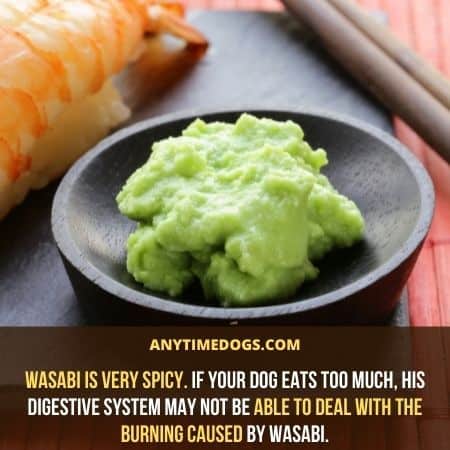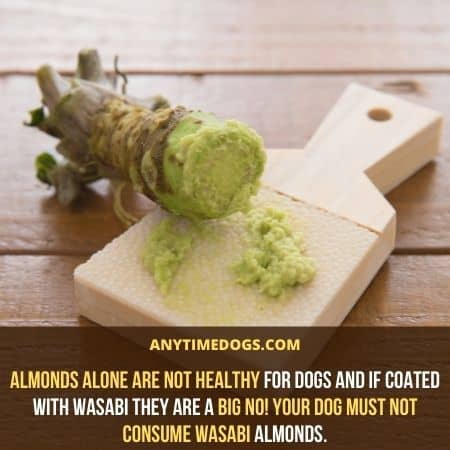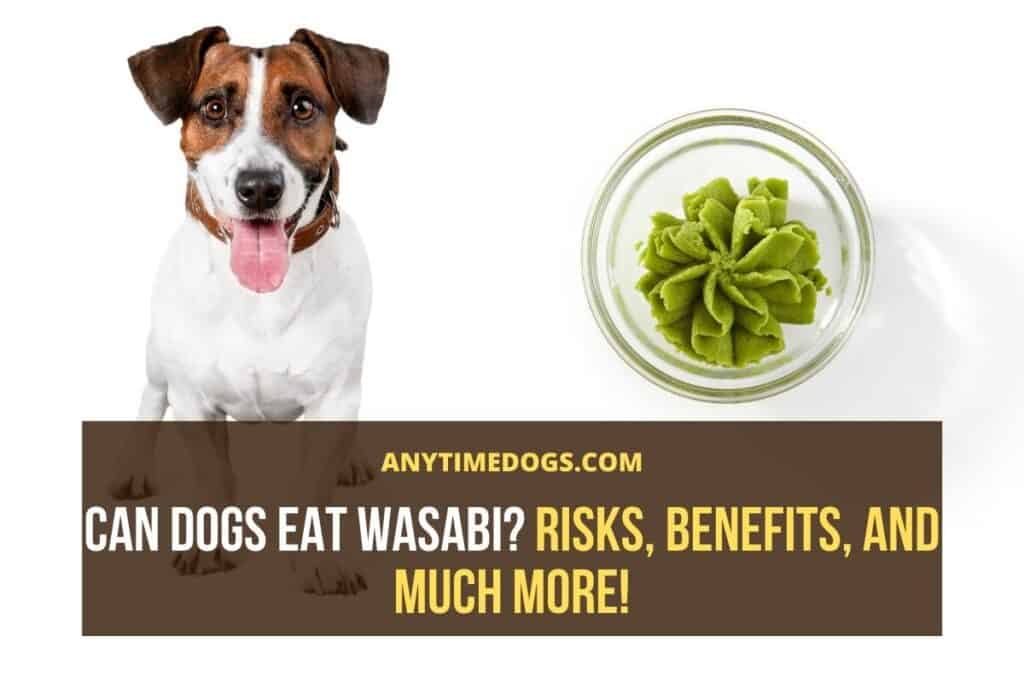Wasabi can be a tasteful treat for your tastebuds, but what about your furry companion? If you are wondering can dogs eat wasabi, or Is it safe for them, we have everything you need to know about dogs and wasabi.
Wasabi is a strong spice used in food and can let you tear up easily. It can aid human health in some ways.
But when it comes to a dog, wasabi is discouraged. It’s not toxic but its spiciness can hurt your dog’s mouth and can cause gastrointestinal troubles.
What if your dog ate wasabi accidentally? What can you do? Let’s figure it out!
You can also read our guides on dogs eating pickles, olives, caramel, basil, granola, pretzels, marshmallows, vanilla, and much more!
Can Dogs Consume Wasabi? Is It Good for Their Health?
Wasabi can irritate your dog’s sinuses, but this does not mean it is unacceptable for your dog.
Wasabi has antibacterial, anti-cancer, and anti-inflammatory properties for human bodies. It contains minerals like potassium, magnesium, zinc, calcium, and also vitamins C, A, B1, B2, B3, and B6. It also helps with allergies like asthma and neurodegenerative diseases.
There are not enough studies to prove that our furry friends can also reap the same benefits. You must consult your veterinarian before adding any new food to your dog’s staple diet especially if it’s dedicated human food.
1) Is Wasabi Poisonous for Dogs?
The wasabi plant belongs to the cruciferous family that includes cabbage, horseradish, and mustard. Although wasabi is not toxic to dogs, you should avoid feeding it to your dog.

Wasabi is very spicy. If your dog eats too much, his digestive system may not be able to deal with the burning caused by wasabi. It can also cause mouth burns, vomiting, gas, and diarrhea.
2) Ancient History of Wasabi:
Wasabi is a spicy herb that originated in Japan. It grows in the mountainous cold area of Japan. Old Japanese legends say that wasabi was found by a villager far somewhere in the mountains.
He took this plant to warlord Tokugawa Ieyasu, and he likes it so much that he said that it can only be grown in the Shizuoka area. Wasabi is the desired spice in Japanese culture and is consumed almost every day.
Wasabi also has many health and medicinal benefits. Large-scale wasabi cultivation began between 1603 and 1868 and then spread to other parts of the world for cultivation.
Wasabi is difficult to cultivate because it requires specific conditions, such as cold weather and clean water with the right mineral ratio. Some other countries where this plant can be grown are New Zealand, China, Canada, some parts of the United States, and other countries.
3) Why Dogs Should Avoid Wasabi?
There is a compound known as Allyl isothiocyanate which makes wasabi spicy and hot. It produces a strong unpleasant odor which is used by the wasabi plant to keep herbivores (horses, cows, deer) away.

This is a defensive compound that makes plants produce tangy chemicals so that plant-consuming animals do not get interested. So, why give it to your dog?
It is strongly recommended that you should not feed wasabi to your dog. Their food must have safe ingredients. If a typical food is safe for human consumption, it doesn’t that you can share it with your dog too.
For example, garlic is safe for humans but harmful for dogs. It can cause anemia in dogs, increased heart rate, or even collapse.
Make sure to feed your dogs with quality dog food and do not risk their health with destructive human food.
4) Can Dogs Eat Synthetic Wasabi Paste?
Over 95% of wasabi paste consumes by humans is fake. Yes, it’s true. The sauce you get with sushi does not contain real wasabi. It is a mixture of horseradish, mustard, citric acid, and a green dye.
Citric acid can be troublesome for your dog while horseradish can be irritating. It can cause central nervous system depression.
Knowing the fact that wasabi is mostly fake, we suggest you keep your dog away from eating wasabi.
5) Side Effects of Wasabi on Dogs:
You must do proper research before introducing any human food to your dog. Before you allow your dog to eat wasabi, you should know the consequences it can have on your fur baby.
- Upset stomach
- Abdominal pain
- Gas
- Bloating
- Vomiting
- Diarrhea
- Burning in nose and mouth due to spiciness of wasabi
6) How Would You Know If Your Dog Ate Wasabi?
Did you forget some left-over wasabi sauce of your sushi on the table? Are you suspecting that your dog might have licked that? Don’t worry you can confirm that. If dogs eat any spicy food, they usually show the following signs:
- Rubbing their nose and mouth on the floor due to the hot fumes of wasabi
- Licking their lips to get rid of the taste in their mouth
- Copious sneezing
- Looking for water and drinking a lot
- Dropped ears
- Tongue hanging out
- Tense jaw
- Sniffling
- Tail tucking between legs
- Running all around
7) Things to Do If Your Dog Ate Wasabi:
However, a bit of wasabi may not hurt your canine but you can always take precautions when required.

If your furry companion has consumed an ample amount of wasabi, you can take the following steps to recover his easiness.
- Instantly remove wasabi remains out of his mouth
- Clean his mouth with water
- Make him drink plenty of water
- Keep an eye on his body language
- If any worse symptoms persist, you must immediately call his Vet for professional advice!
8) Are Wasabi Peas Safe for Dogs?
Peas are a significant source of fiber, iron, and vitamins A, K, and B. So are wasabi peas good for your dog?
In short, no, peas are not suitable for dogs having kidney problems. When consumed in large quantities, peas can cause gastrointestinal issues.
Wasabi peas are a crispy snack made from fried peas seasoned with wasabi. They contain starch, sugar, salt, and oil.
Although one or two peas will not risk your dog’s health but knowing all the facts, we suggest you keep wasabi away from your dog in any form.
9) Can Dogs Eat Wasabi Almonds?
Dr. Richard Goldstein, chief medical officer at the Animal Medical Center in NYC says, “Almonds are not toxic but they can cause gastric problems in dogs”.

Almonds alone are not healthy for dogs and if coated with wasabi they are a big NO! Your dog must not consume wasabi almonds.
You can also learn about the consumption of almond milk for your dog.
10) Can Wasabi Cause Allergy in Dogs?
Wasabi has a very strong smell and its spiciness can irritate the human nose. It can cause allergic reactions as well due to horseradish, gluten, and the low-quality dye present in fake wasabi sauce.
If your dog is allergic to any of the ingredients mentioned in this article, you must remove wasabi from your home to be on the safe side.
Can Dogs Eat Wasabi? Final Thoughts:
Although, a little wasabi doesn’t endanger your dog’s life. But a responsible dog owner never risks his pet’s health.
So, the right thing to do is to keep feeding your dog with his recommended dog food. Avoid all those foods that are for human consumption. Make sure you don’t forget your food leftovers anywhere he can reach easily.
It’s in your charge to take care that your dog is following a healthy and adequate diet. You must seek professional advice every time you want to add something new to your dog’s diet.
Let everyone eat the food meant for them and stay safe!

